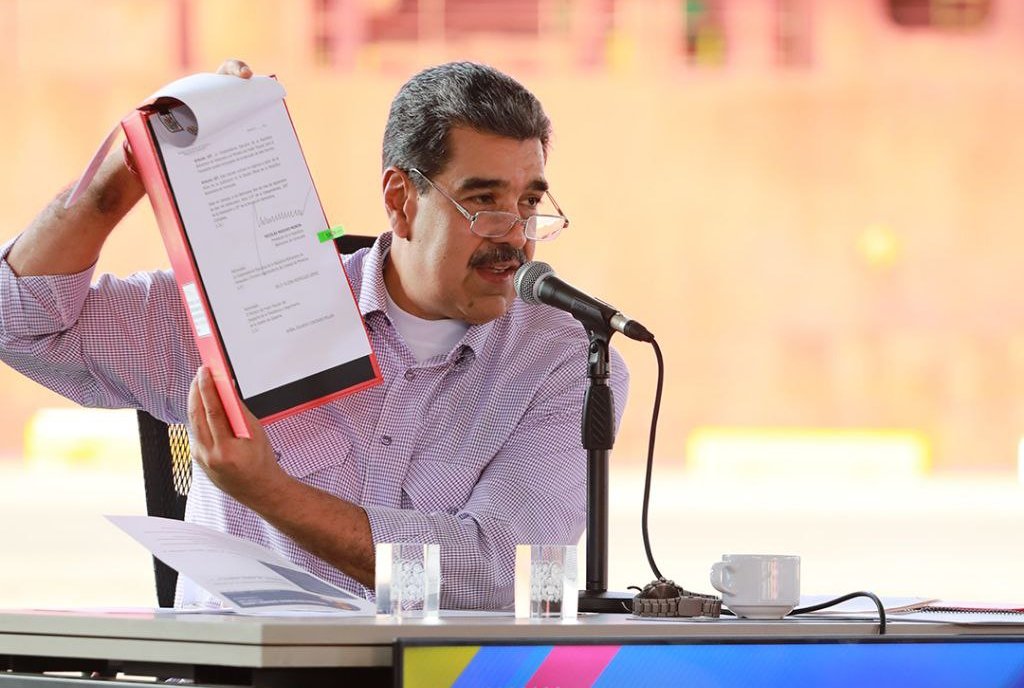Maduro reshuffles trade and foreign exchange administrations
Venezuela's Nicolas Maduro speaks to the Productive Economy Council on Thursday, 19 September.
On 19 September, Venezuelan president Nicolas Maduro announced changes in the administrations relating to trade and ports, as he spoke to the Productive Economy Council.
Maduro is putting an end to the National Centre for Foreign Commerce, CENCOEX, which is in charge of currency exchange for imports and exports. The president said that oil rents are being lost to private capital through its current system.
CENCOEX will be replaced by the Venezuelan Export Promotion Agency, although the details of what will change have not been made public.
The announcement also included an intervention into the ports system, and a board to promote non-oil exports.
Hard times for exports
The reshuffle is made in the context of grim growth prospects and mounting pressure on the bolivar. The gap continues to hover around 20%, between an official rate of USD 1 : VES 36.7 and a black market rate of 1 : 44.
In last month’s cabinet reshuffle Vice President Delcy Rodriguez, who has been in charge of the economy since 2020, took direct control of the oil ministry. The objective is to ramp up crude oil production—the country’s principal source of hard currency and state revenues—in an uncertain environment.
Opposition activists, alongside certain members of US Congress, are pushing to end OFAC licenses for oil corporations to operate in Venezuela, which act as exceptions to sectoral sanctions. They argue that these companies are “the lifeline of the regime” as Chevron alone contributes 30% of hard currency revenue for the Venezuelan state.
After the 28 July election, the main opposition alliance is seeking to oust Maduro, saying it has proof that the president claimed victory unjustly by carrying out widespread fraud.
Oil exports are already taking a hit by a combined effect of falling global prices and a widening discount for Venezuelan crudes.
Even if the current sanctions system is left unchanged, exports will still struggle as tensions mount with Spain and the European Union more broadly. The bloc has become a key trade and investment partner, especially after Russia’s invasion of Ukraine. It is highly unlikely that relations will break down completely, but new investment decisions could stall.
The Spanish and European parliaments have recognised Edmundo Gonzalez, the main opposition candidate in the 28 July election, as the winner and president-elect. However, the executive branches have called on Maduro to prove that he won the election, short of recognising a victor.
Foreign trade agencies
The CENCOEX replaced CADIVI, another agency in charge of providing dollars for imports. By selling cheap dollars, CADIVI became infamous for subsiding importing businesses at an enormous cost, also being taken advantage of by corrupt actors.
CADIVI exchange controls were in large part to blame for uncontrolled inflation, the dwindling of foreign exchange reserves, and the destruction of domestic industries in the decade of economic collapse that Venezuela recently endured.
The new agency will be managed by Daniela Cabello, the daughter of Diosdado Cabello, a leading figure in Chavismo who was recently appointed as Interior Minister.
Daniela Cabello has a high profile on social media, and runs Marca Pais, a state-led campaign to promote Venezuelan products and tourism.
Ports and non-oil exports
Maduro also announced an “Intervention Board for Venezuelan Ports” to “restructure” the docks. In implied references to corruption, he said that the goal was to “improve administrative processes and clean up the country’s ports.”
Counter Admiral German Gomez has been designated to oversee the board, as well as the state-owned ports company, Bolivariana de Puertos, SA.
Gomez was recently promoted from ship captain, while he was president of the National Institute of Aquatic Spaces.
Venezuela’s president highlighted the need to encourage exports beyond oil, and set up a “general staff for non-oil exports,” to be led by Vice President Rodriguez.
In July, the National Assembly approved a Non-Oil Export Promotion Act, which is meant to simplify bureaucratic processes. There is also a tax reimbursement for non-oil exports and a fund to be paid for with a special 0.5% tax on imports.
Just like with the special economic zones, business figures have questioned the government’s promise of reimbursements, preferring tax exemptions as more effective in attracting investment.

